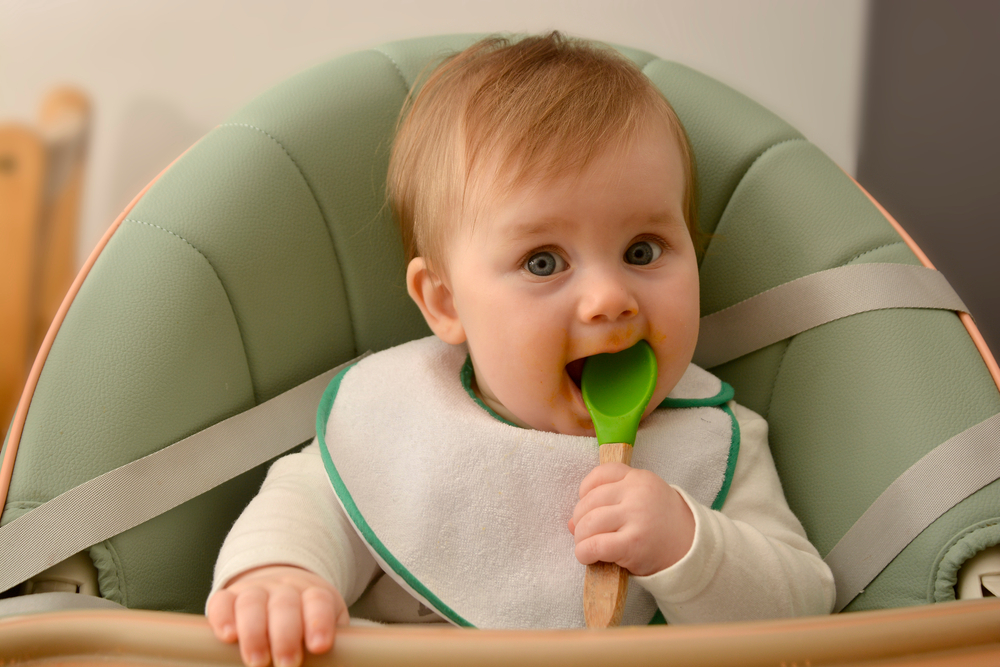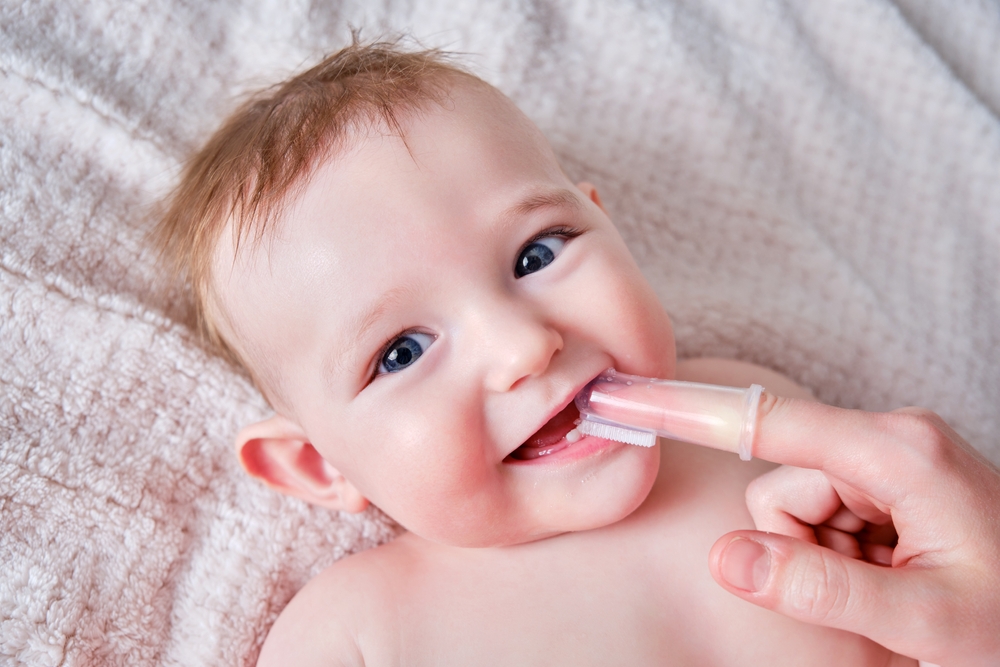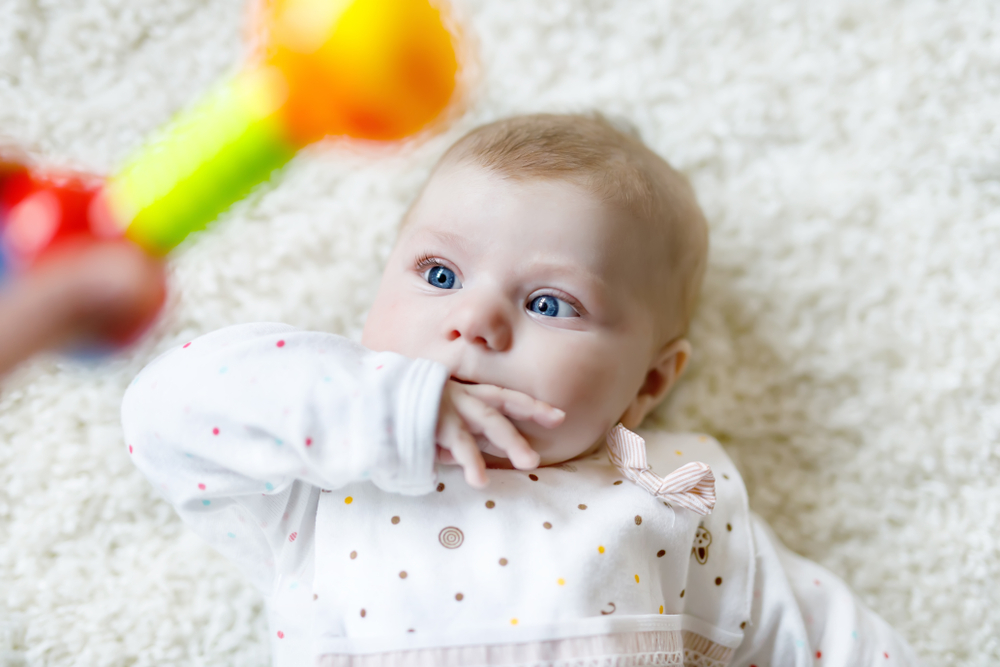Your 7-Month-Old: Milestones, Developments, and Expert Tips

Welcome to month seven! Your baby has been growing and changing every day, and this month will be no different. Here are some of the things you can expect of your 7-month-old baby, including developmental changes and milestones.
Contents:
- Physical Development
- Behavioral Milestones
- Teething
- Daily Routine
- Health and Safety
- How to Promote Baby’s Development
Physical Development

Ekaterina Pokrovsky/Shutterstock.com
At seven months of age, your baby is getting bigger and more mobile. For moms and dads, that means baby is even more of a handful but also lots more fun! Physically, your little one will likely weigh between 13 and 22 pounds, and boys tend to be slightly bigger than girls at this stage.
If your baby was born premature, they may still be on the low end of the growth chart. That’s normal. Any deficits in size caused by prematurity will usually disappear by age two, though.
In terms of mobility, you can expect your baby to begin moving around even more than last month. At seven months, most babies will begin rolling around and sliding their bodies forward (aka creeping). Some eager little ones will even start to crawl this month!
Behavioral Milestones
You’ll likely notice your baby moving around more during the seventh month, but that’s not all that’s going on with your little one at this stage. Your child will also be doing more since they’re developing at lightning speed right now. Here are some important things to watch for.
Motor Skills
At seven months, your child’s fine and gross motor skills are developing. Fine motor skills—those responsible for smaller movements like pinching and grasping, for example—enable your 7-month-old baby to hold small objects and transfer them from one hand to another.
Gross motor skills—those that control the larger muscle groups—are also improving this month. The result? Your baby may begin sitting up without assistance. You may also notice their legs getting stronger, holding more weight while bouncing or standing.
Hand-Eye Coordination
In addition to motor skills, your baby’s hand-eye coordination is also getting better this month. While this is good news for your little one, you’ll find that you need to be more vigilant as a result. That’s because babies this age often begin picking up objects and bringing them to their mouths!
Communication

Monkey Business Images/Shutterstock.com
Alongside physical gains, your seven-month-old is also beginning to communicate more. This month, you’ll likely notice continued babbling, but this babbling may start to sound more like talking. Instead of one or two syllables at a time, babies will often begin linking sounds together at month seven, so they resemble words and sentences.
At this age, little ones are starting to really experiment with the language they hear around them. They may even start to make distinct vowel and consonant sounds. Your child’s babbling will also likely start to take on some meaning, though it may not be recognizable as actual words yet.
Nonverbal communication is also blossoming this month. You’ll probably see your child wearing different facial expressions that coincide with their mood. Other body language cues may include reaching for you when they want to be held or flailing their body around when upset.
Listening is another key aspect of communication and one that is developing significantly this month. If you haven’t noticed your child responding to their name, this milestone is likely on the horizon. And though your child may still not obey for a while, 7-month-olds can typically recognize the word “no.”
Stranger Anxiety
Since the seventh month is the month that most babies start to recognize faces, stranger anxiety may become an issue. When your child sees a face they don’t know, it may be alarming to them. Just know that this is a perfectly normal part of your child’s development and not something to be overly worried about.
If your little one begins to cry when someone besides you tries to hold them or play with them, they are likely experiencing stranger anxiety. Introducing your child to new people often can help. Staying near them as they interact with a new person is also a good strategy. Stranger anxiety often starts to get better on its own around 18 months.
Object Permanence
If you haven’t heard of the concept of object permanence, it’s sure to come up this month. Object permanence is the acknowledgment that something still exists even if it’s hidden from sight. At seven months, babies start to realize that their toys don’t disappear forever when they’re covered by a blanket, for example.
Although it’s called object permanence, this important milestone in brain development applies to people too. This means your child may also start to miss you when you leave for the store without them. This is actually a good thing, as it means your baby is forming healthy emotional attachments!
Teething

Zhuravlev Andrey/Shutterstock.com
Experts say that most babies begin teething between 4 and 7 months, so if you haven’t seen any teeth yet, this will likely be the month that you do! While this is certainly an exciting time, it can also be challenging for little ones (and their parents too!). Teething babies often have gum and mouth pain, which can make them understandably irritable.
Medicine should be a last resort and should only include treatments specifically recommended by your pediatrician. Fortunately, there are some things you can do to help relieve the pain and put your child in a better mood.
Doctors recommend some safe home remedies like a cold teething ring or cool water. You can also try gently rubbing your baby’s gums with your fingers. If teeth are coming in, just be careful not to get bitten!
To know more about teeth growing read What should a 5-month-old baby do? and What can a 6-month-old baby do? Milestones guide.
Daily Routine
Since there are some big changes this month, you may have to change up your daily schedule a bit to accommodate your growing baby. Here are some guidelines you may consider following during your child’s seventh month of life.
Sleep and Feeding
Some good news regarding sleep this month—your baby may start sleeping through the night! Little ones this age normally begin snoozing for longer stretches (up to 11 to 12 hours at a time!), so you can expect to scale back on nighttime feedings.
Since your baby is still growing at a rapid pace, though, you’ll need to make up for these missed feedings during the day. At 7 months, your little one still needs at least 24 ounces of formula or breastmilk a day in addition to eating from a menu of solid food.
Of course, weaning is a process that can vary from baby to baby and family to family! Even so, you might consider introducing finger foods and sippy cups for drinking this month.
Though your baby will be eating more “meals” this month, don’t worry if they don’t finish whole jars of baby food at a time. Just start out with two or three spoonfuls, and let your child take the lead.
Games and Toys
Since your little one is sleeping more at night this month, they will be awake for longer periods of time during the day. This is an excellent opportunity to experiment with new games and toys! Your baby’s improved communication, motor skills, and hand-eye coordination open the door for many beloved activities like “Peek-a-Boo,” building blocks, and clapping along with nursery rhymes and songs.
As you’re introducing new toys for your child this month, be sure to avoid any small removable parts. Remember, your baby’s grasping skills are improving, and 7-month-olds love to put things in their mouth. You’ll need to be on guard for any potential choking hazards.
Schedule
Sticking to a schedule with a baby in tow can be challenging and exhausting. Even so, you may find that getting into a routine is good for everyone involved. Of course, it’s okay if your schedule doesn’t look like other moms’ and dads’. Trust your instincts and your child’s, and do what’s best for your family.
Health and Safety

Photographee.eu/Shutterstock.com
The health and safety of your baby are always top of mind, and the seventh month will be no different. Still, there are some specific things you’ll want to be aware of this month that could impact your child’s wellbeing.
Typical Diseases and Remedies
One downside of month seven is that you may begin noticing that your child gets sick more frequently. Though unfortunate, it really shouldn’t come as much of a surprise. Babies of this age are putting things in their mouths more frequently. They may also be exposed to more germs at daycare or on playdates, for instance.
Colds and ear infections are some of the most common culprits at this age, but they’re usually mild. Still, you’ll want to contact your pediatrician if your child is noticeably ill or is running a fever. A severe cough is also nothing to ignore.
While taking your sick child to the doctor is almost always recommended at this age, there are also some things you can do at home to help your baby feel better. A lukewarm bath is a great home remedy for bringing a fever down, for instance. For a cough, try saline drops or a humidifier.
Common Concerns
It’s common for parents to overreact when babies don’t develop according to the standard. These concerns are usually unfounded. All babies are different, after all! Even so, there are some developmental milestones that, if missed, could indicate a problem. Check with your child’s pediatrician if you notice any of the following behaviors:
- doesn’t sit or stand with assistance;
- isn’t rolling over;
- doesn’t babble;
- doesn’t respond to your voice;
- has lost any skills from the previous month.
How to Promote Baby’s Development

Tomsickova Tatyana/Shutterstock.com
Your baby will do most of the work this month. Growing up is hard! Still, there are some things moms and dads can do to support a 7-month-old’s healthy behavior and development. Here are some things to try. If your baby responds well to these techniques, keep it up. That’s a good sign they’re working!
Talk and read to your baby
Your child is learning how to communicate, which is a crucial skill to have. You can encourage your baby’s language acquisition by talking to them regularly. Strike up a “conversation” and listen to your little one’s adorable response.
Reading to children at this age is critical. Why? Listening to a story helps your child’s brain absorb important cues about our language’s patterns and rhythm.
Provide a safe space for exploration
Your 7-month-old is moving around independently more than ever before. And this pattern will only continue. One of the best things you can do at this stage is to make sure your child has a safe place to explore.
Remove any hazards like sharp objects or small items that could end up in your baby’s mouth. And of course, be sure to provide adequate boundaries and supervision so your little one doesn’t wander off alone.
Make time for play
For adults, playtime may seem trivial. For your baby, though, it’s absolutely critical. At this stage, playing is your child’s way of learning about the world and developing vital skills.
You can offer your support during playtime just by being there and interacting with your child. They will take cues from you while learning about the world around them. Plus, you’ll be forming important bonds and making precious memories!
Month Seven and Beyond
This month will go by in a blur. There are so many developmental milestones on the 7-month checklist, it can make your head spin. Our advice is to slow down as much as possible and try to take everything in.
After this month, your child will never be seven months old again! Enjoy every moment, even the challenging ones. If you’ve found this article helpful, be sure to share it with your parenting community. And if you have a spare moment between rounds of pat-a-cake, leave us some feedback. We always love hearing from our moms and dads!
SEO Description: Discover important information about your 7-month-old baby. This article provides facts about developmental and behavioral milestones in the seventh month and tips for how to keep your little one healthy and happy.
The picture on the front page: Erhan Inga/Shutterstock.com
Проверьте электронный ящик



















